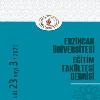English Teacher’s Self Evaluation of ICT Skills, Use and Pedagogical Content Knowledge in e-INSET NET Programme
electronic in-service training, distant learning, professional development
___
- References
- Beduk, A. E. (1997). Okullar da hizmetici egitim planlamasi yapabilmeli ve uygulamalıdır. [Schools should be able to plan and implement in-service training], Milli Egitim, 133, 7-8.
- Çakıroğlu, E. & Çakıroğlu, J., (2003). Reflections on Teacher Education in Turkey. European Journal of Teacher Education, 26, 253-265.
- Cakmak, F. Revisiting and Modularizing INSET for Language Teachers in Turkey and the UK, 42nd IATEFL Annual International Conference, 7- 11 April, 2008, Exeter, UK.
- Carr, R, Fung, Y. & Chan, S. K. (2002). Distance education for teacher education: Hong Kong experience. Professional Development in Education, 28(1), 163-178.
- Jung, I. (2005). ICT-pedagogy integration in teacher training: Application cases worldwide. Educational Technology and Society, 8(2), 94-101.
- Knowles, M. S. (1984). The Adult Learner. A neglected species (3e), Houston: Gulf Publishing.
- Lutonsky, R. R. (2009). Pre-service and in-service training, gender, and years of teaching experience: Influences on teachers' basic technology competencies. Unpublished Doctorate dissertation. The University of Alabama: Alabama, USA.
- Mirici, I. H. (2006). Electronic in-service teacher-training for the new national EFL curriculum in Turkey. Turkish Online Journal of Distance Education-TOJDE, 7 (1 ), 155-164.
- Moonen, B. H. (2001). Teacher learning in inservice networks on Internet use in secondary education. Unpublished doctorate dissertaiton. Enschede, The Netherlands: University of Twente.
- Mouzakis, C. (2008). Teachers’ perception of the effectiveness of a blended learning approach for ICT teacher training.
- Journal of Technology and Teacher Education, 16(4), 461-482.
- Ozer, B. (2001). Ortaöretim ogretmenlerinin mesleki gelisime yaklasımı [Secondary school teachers’ approach to professional development], Unpublished Research Report. Eskişehir.
- Ozer, B. (2004). In-service training of teachers in Turkey at the beginning of the 2000s. Journal of In-service Education, 30, 89-100.
- Roberts, J. (1998). Language teacher education. London: Arnold.
- Sahin, M. (1996) Milli Egitim Bakanligi hizmetici egitim faaliyetlerinde karsilasilan sorunlar (Ilkogretim ornegi) [The problems faced in the in-service activities of the Ministry of National Education – primary school sample], Unpublished MA Dissertation, Ankara Üniversitesi Sosyal Bilimler Enstitüsü.
- Strategic development branch, 2009, retrieved on May 28, 2010, from http://hedb.meb.gov.tr/net/index.php?option=com_content&view=article&id=70:strateji-gelitirme-ubesi&catid=39:ubelerimiz&Itemid=63.
- Taymaz, A.H., Sunay, Y. & Aytac, T. (1997) Hizmetiçi eğitimde koordinasyon sağlanması toplantısı [Co-ordination meeting for in-service training], Milli Egitim, 133, 12-16.
- Tyack, D. & Cuban, L. (1995). Tinkering toward utopia: A century of public school uniform. Cambridge, MA: Harward University Press.
- Yıldırım, S. (2007). Current Utilization of ICT in Turkish Basic Education Schools: A review. International Journal of Instrcutional Media, 34(2), 176-186.
- Yayın Aralığı: 4
- Başlangıç: 1999
- Yayıncı: Erzincan Binali Yıldırım Üniversitesi
Gözde İNAL KIZILTEPE, Özgün UYANIK, Münevvver CAN YAŞAR, Fatma ALİSİNANOĞLU
Münevver YAŞAR CAN, Gözde KIZILTEPE İNAL, Özge UYANIK, Fatma ALİSİNANOĞLU
Kan Bağışı Tutum Ölçeğinin Geliştirilmesi: Geçerlilik ve Güvenilirlik Çalışması
Yusuf ABDULRAHEEM, Bello Bolanle MUİNAT, Owede Victory COLLİNS
Bir Geçerlik ve Güvenirlik Çalışması: Kan Bağışı Tutum Ölçeği
Öğrencilerinin Ev Temelli Fen Öğrenme Etkinliklerine Aile Katılımı
